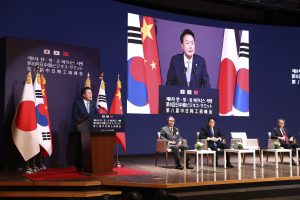The Japan-China-South Korea trilateral summit was held in late May, the first such meeting in about four and a half years. The summit adopted a joint declaration, and was accompanied by bilateral meetings between Japan and China, Japan and South Korea, and China and South Korea.
What prompted the summit? There are several explanations. One is that China is trying to keep its neighbors in check, as Japan, the United States, and South Korea strengthen their relations. Another reason is that each country wanted to bolster ties with its neighbors amid an uncertain international political environment ahead of the U.S. presidential election. Finally, it could be argued that with China returning to a policy of neighborhood diplomacy, the China-Japan-South Korea trilateral summit was on its list of measures.
In the wake of the summit, some observers in Japan claimed that it did not produce any results. This seems a somewhat overly pessimistic take. For one thing, at a time of numerous challenges, it is notable in itself the leaders of the three countries were able to sit down at a table for dialogue, and even issue a joint declaration. Especially at the bilateral meetings, each leader conveyed “what ought to be said.” This was likely done with domestic public opinion in mind, but the expressions of “what ought to be said” were relatively low key. Although Japan did protest to the Chinese over the issues of Fukushima’s ALPS treated water and the detention of Japanese nationals, the protests were fairly restrained. With such an uncertain global outlook, some credit should be given to the three countries for being able to affirm peace and stability within the region.
Moreover, there were some concrete outcomes, such as the agreement to go ahead with negotiations on the China-Japan-Republic of Korea Free Trade Agreement (Trilateral Free Trade Agreement). The Regional Comprehensive Economic Partnership (RCEP) has already entered into force, so Japan, China, and South Korea already have an FTA. However, RCEP includes ASEAN countries, so the degree of liberalization is quite limited. As such, it is significant that the aim is to conclude an FTA that goes further than RCEP manages to do.
The issue of economic security, which makes it exceedingly difficult to liberalize the markets for high-spec, sensitive products, may ultimately make it difficult to conclude an FTA. Still, it is meaningful for the three countries to meet and exchange information with each other with an FTA as the ultimate goal. Each country will benefit from understanding what the other two value and what they are most sensitive about.
Third, China, Japan and South Korea each explicitly stated that they will jointly address their common issue of a “low birth rate and the aging society.” There are no specific plans for how to go about this, but it is a major step forward that acknowledges this issue common to Northeastern Asia and demonstrates a willingness to tackle it.
However, this summit also made clear the degree to which the three East Asian neighbors are out of step. There is of course the issue of North Korea. As suggested by its satellite launch test, timed to coincide with the summit, Pyongyang seemed quite wary that it might come up at the summit. The original intention would have been to reaffirm the goal of “denuclearization of the Korean Peninsula,” which has been in place since the Six-Party Talks. However, “denuclearization” was not included as a joint goal in the declaration, likely out of Chinese consideration for North Korea. Ultimately, the declaration only states that the parties expressed their respective opinions on the “denuclearization of the Korean Peninsula.”
Northeastern Asia has a fundamental security problem. The trilateral summit notwithstanding, the Chinese Navy and Coast Guard are unlikely to scale back their activities in the East China Sea and around the Senkaku Islands. In fact, they may well intensify. Given these tensions, though, the fact that the three countries were able to sit down at a table, reach an agreement, and produce a joint declaration despite their differing opinions is significant, in the sense that they have at least superficially affirmed that their goal is regional peace and stability.

































